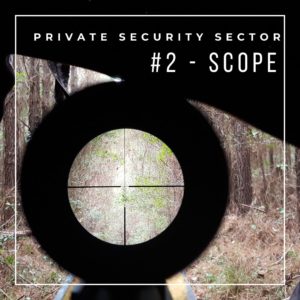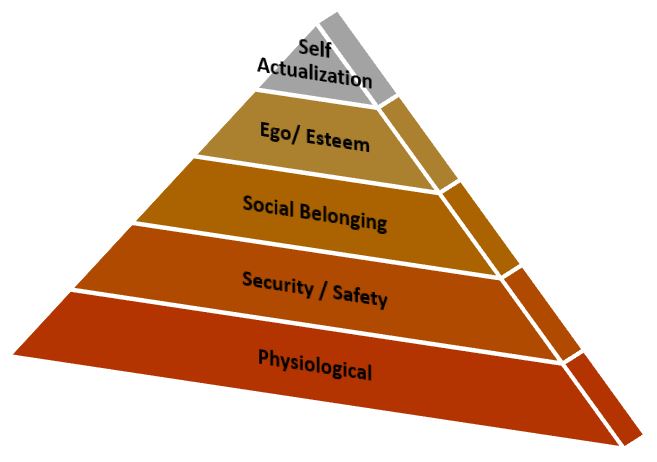Belgian private security sector #2 - Scope
This second chapter focusses on the scope of the study in order to properly define it.
Who is the sponsor of the study, what topic do we address, which geography do we cover. And finally, what temporality do we deal with?
This series of publications are extracted from my final paper written within the frame of university certificate on foresight (UCL – Sept 2018)

Sponsor
As for any project, your foresight study requires a sponsor.
In this private security sector study, the choice of sponsors was plethoric, indeed, the theme – however not leading to extensive press coverage – unleashes passions.
- political party
- Police
- Army
- League for Human Rights
- Trade association representing the sector
- Private company active in the sector in question
- …
We certainly miss a couple of them.
We have fictionally opted for an association representing the interests of users in the private security sector and regrouping companies offering private security services. The analysis does not aim (in our approach) to define a company’s vision and strategy but to serve the greatest number of people for an issue that is common to them: how the private security sector will evolve and how it will guarantee the security of its users.
ECSA, the European Corporate Security Association
ECSA, the European Corporate Security Association, was created in 2005 on the initiative of various stakeholders:
– security directors/managers of large companies
– European and international institutions
– experts from the Justice and Home Affairs public services (Eurojust, Europol, …)
Its mission is to work towards corporate security. It should be understood to mean:
« To protect the interests of the Organization against risks of malicious origin through technical, organizational and research measures[1].
The objectives of ECSA are as follows:
– Provide its members with a secure forum for:
o The sharing of common issues and experiences
o Information and education
o Networking among members and with third parties
– Liaise and promote synergy between relevant organizations and associations in the academic, research, scientific, public and private sectors.
– Stimulating Public-Private Cooperation
– Establish and maintain a communication channel for information exchange and emergency alerts.
It will then be up to member companies using security services (demand side) and companies offering such services (supply side) – if they so wish – to carry out a process of their own in order to define the specific future desirable for each of them and in line with their values and culture.
[1] De Mesmaeker Y. (2017). ANPA Public-privé. ECSA
Topic
We are going to look at the private security industry. Security is a promising subject if ever there was one, because it affects the individual and one of his basic needs as defined by Maslow.
Within companies, we find the same need for protection for their assets, consisting of :
– their staff
– their physical and IT infrastructure
– their customers
We exclude road safety as well as environmental safety from our scope.

Geography

We confined ourselves to Belgium. The legislation is indeed national and not European.
As far as standardization is concerned, there are some:
– at the international level (ISO = International Standards Organization* ). For more information, we refer to the website dedicated to ISO/TC 292 « security and resilience ».
– at European level (CEN = European Committee for Standardization). The CEN TC 439 technical committee deals with the security matters we are concerned with.
« The main objectives of CEN/TC 439 are as follows:
- Standardize in the field of civil private security services where necessary;
- Bring all standardization activities related to private security under one roof;
- Increase the quality of the security services in question;
- Review, maintain and improve the standards developed by existing technical bodies:
- EN 15602 « Security Services Providers – Terminology ». (CEN/BT/TF 167 « Security Services »)
- EN 16082 « Airport and Aviation Security Services ». (CEN/TC 384 « Project Committee – Airport and aviation security services »)
- EN 16747 « Maritime and Port Security Services ». (CEN/TC 417 « Project Committee – Maritime and port security services »)
- Map the needs and priorities for standardization in the field of Critical Infrastructure Protection (CIP). »**
On the latter point, there is an initiative to create a European standard to « define security guidelines » for critical infrastructure. This was established in 2017, with an initial meeting in November at NBN’s initiative. This meeting aimed at exchanging views and experience and brought together various private and public stakeholders concerned with critical infrastructure protection.
Title of the standard:
« Private Security Provision for the Protection of Critical Infrastructure. » (EN 17483-1)
Scope of the standard:
« This European Standard specifies service requirements for quality in organization, processes, personnel and management of a security service provider and/or its independent branches and establishments under commercial law and trade as a provider with regard to security services. It lays down quality criteria for the delivery of security services requested by public and private clients or buyers. This European Standard is suitable for the selection, attribution, awarding and reviewing of the most suitable provider of security services ».

Belgium was not represented at the presentation of the first draft/draft in Vienna in February 2018. This illustrates the efforts that still need to be made to improve security awareness and the importance of heritage protection among the various stakeholders, even though they are directly concerned.
The professional actors of private security are able, like any other European citizen, to take part in the public inquiry currently conducted: from April 30, 2020 till June 29, 2020. Public inquiry was originally foreseen for beginning of 2019 and publication for March 2021, if it is published at all. It seems to be postponed by 1 year.
Temporality
François Bourse defines 3 prospective time horizons:
The short term characterized by :
- Current dynamics and inflections
- Possible ruptures

The medium term characterized by :
- Trends
- Uncertainties
- Structural transformations of the intervention context
Exactly the context in which the private security sector finds itself, with, in particular, a trend towards digitalization which is accelerating change.
e.g. Gartner estimates that the use of Machine Learning in enterprise security will be the norm by 2025.
A (relative) acceleration in the revision of legislation. Indeed, 56 years elapsed between the law on private militias (1934) and the law on private and particular security of 1990; 27 years elapsed before seeing a major revision of this same law (2017); if we keep the same trend, a next revision could come into being in 2030.
The long term characterized by :
- Great deep dynamics
- New orders of magnitude
- Paradigm shift
We have therefore chosen 2030 as our time horizon.
Sources, Useful links & Resources
ECSA – European Corporate Security Association www.ecsa-eu.org
*ISO/TC 292: Standardization in the field of security to enhance the safety and resilience of society
**CEN (2015). Business Plan CEN/TC439 Private Security Services.
NBN meeting 16/11/2017 – Van Der Valk Hotel
NBN Enquiry Portal : https://pe.nbn.be/wi/pecen
Gartner (3 July 2018). Gartner identifies the Top Six Security and risk management trends.
François Bourse literature